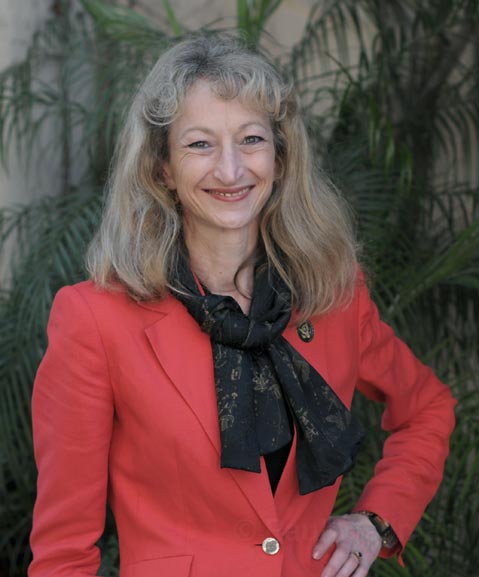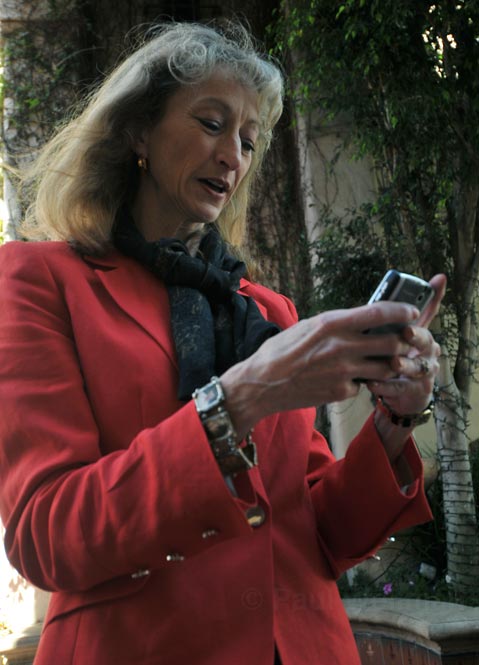Debra Bowen’s Battles
California’s Secretary of State on Special Elections, Open Government, and More

On Monday, over iced tea and the smell of burnt toast in Jeannine’s on Figueroa Street, the Californian charged with making sure every vote does count spoke to The Independent about the trouble with special elections, the quest to make the state government as transparent as possible, and how trivia via Twitter is an integral tactic of getting young people to the polls. Those are just some of the challenges to being Secretary of State, explained current officeholder Debra Bowen, who was in town to visit the “frequently very underappreciated” county election employees as they worked on Tuesday’s State Senate race between John Laird and Sam Blakeslee that involved parts of Santa Maria. (Blakeslee appears to have won that contest.)
Such special elections — which are called when the office is vacated due to death, resignation, or higher appointment and occur on average of five times per year across the state — aren’t really worth the price of admission, says Bowen. “The state really needs to look at alternative,” she explained. “The cost is always high and the turnout is usually not so high.” One of the leading options to cut down on the number of these elections is instant run-off voting, in which voters rank their selections so that the electorate’s preferred candidate rises to the top. The City of Oakland is using the system in November, and Bowen is helping other jurisdictions consider the possibility as well.
Another challenge for Bowen, of course, will be retaining the office she’s held since 2006, as she’s up for reelection in November. The Democrat’s opponent is Damon Dunn, the youthful, good-looking, African-American Republican candidate and former pro football player (he caught one pass in two seasons) who has admitted to only voting once in his life. “The office deserves an occupant who’s done better than vote in one election,” said Bowen, who explained that Dunn’s early lead in the money race should be wiped out soon, as she has recently been dealing with relatives’ health problems rather than fundraising.

But rather than bag on Dunn, Bowen — an attorney whose political career started in the 1980s as a volunteer for Neighborhood Watch and Heal the Bay, where she helped stencil stormwater run-off warnings on drains on the Los Angeles coast — prefers focusing on what she’s done for the state. After 14 years of stints in both the State Assembly and Senate — during which time she championed the use of the Internet to make Sacramento more transparent and was also the first to voluntarily post her campaign finances online — Bowen thought about a run at Treasurer, but then found herself focused on the security of the state’s voting systems, having witnessed voters express growing doubts about legitimacy following the two George W. Bush elections. “I became motivated to get it right before we had another horrible disaster for our whole democracy,” said Bowen. “We couldn’t afford another election where there was vast mistrust of the results.”
So after beating popular moderate Republican Bruce McPherson in 2006 to become only the sixth woman ever elected to statewide constitutional office, Bowen mandated testing of electronic voting machines, a process aided by UCSB’s Computer Security Group, which managed to easily hack the devices. Sparking controversy on both sides of the aisle, Bowen ordered testing protocols to be strengthened, a move that eventually won her the JFK Library’s “Profile of Courage Award,” which recognizes public servants who choose principles over partisanship.
Since then, Bowen, who says she strives to mix Jeffersonian ideals with technology, has worked on making political campaign contributions more accessible to the everyday Californian via the Cal-Access reporting system. (See cal-access.sos.ca.gov.) As czar of elections, she doesn’t feel right getting involved in anyone’s campaign, but Bowen did remark on the staggering nature of gubernatorial candidate Meg Whitman’s increasing warchest. “Our software is humming with all the money coming in,” laughed Bowen, noting that she is now confident that the technology can handle “hundreds of millions of dollars.” Meanwhile, the public seems to be slowly getting interested in finding the data, said Bowen, who noticed an uptick in Cal-Access usage during the June election.
The secretary is also proud of expanding her office’s reach even in these tougher times. “We do what we can to stretch our resources in ways that don’t cost anything,” said Bowen, a self-proclaimed geek whose technical focus has certainly helped save money. For instance, she convinced the office to use cloud computing — a means of hosting online information by an off-site company — to handle the increase in web users during election time. That paid off most stunningly for Prop 8, the gay marriage ban of 2009, when the office’s website was viewed at a level 16 times the historic high. To accommodate that many users with an in-house system, the department would have spent nearly $1 million for technology that would then sit dormant for most of the year. Instead, Bowen’s cloud computing contractor sent them a final bill for $14, and then cut that bill in half after realizing they had overcharged.
But technology can’t save anything during the state’s epic budget crunch. Most drastic for Californians who rely on the Secretary of State — a wide-ranging office that is essentially in charge of official record-keeping — are the delays related to getting a business licensed by the state. Due to cuts, said Bowen, a process that once took 10 days now takes more than 70. “That means new businesses cannot hire, they cannot generate sales tax, they cannot generate income tax,” said Bowen, trailing off in the way that politicians do when budget problems appear self-perpetuatingly insurmountable.
As the state’s voting ambassador, Bowen spends plenty of her time speaking to high schools and colleges, and then stays in touch via Facebook and Twitter, which she employs for a regular trivia quiz. “If we can get the young people in the habit of voting when they turn 18, they are more likely to continue to be chronic voters,” said Bowen, who remains optimistic about the next generation of California voters. “They volunteer more and are more politically active than the prior generation,” she said, but they also file as decline-to-state voters more often and are more likely to say that they’re spiritual but don’t adhere to a particular religion. That’s a good sign to Bowen, for it shows “independence of thought” and means that they are “participating on their own terms.”
Come November, when a landslide of younger voters are anticipated to hit the polls due to the marijuana legalization measure, Bowen and the rest of us will find out whether that independent thinking actually translates to voting.



